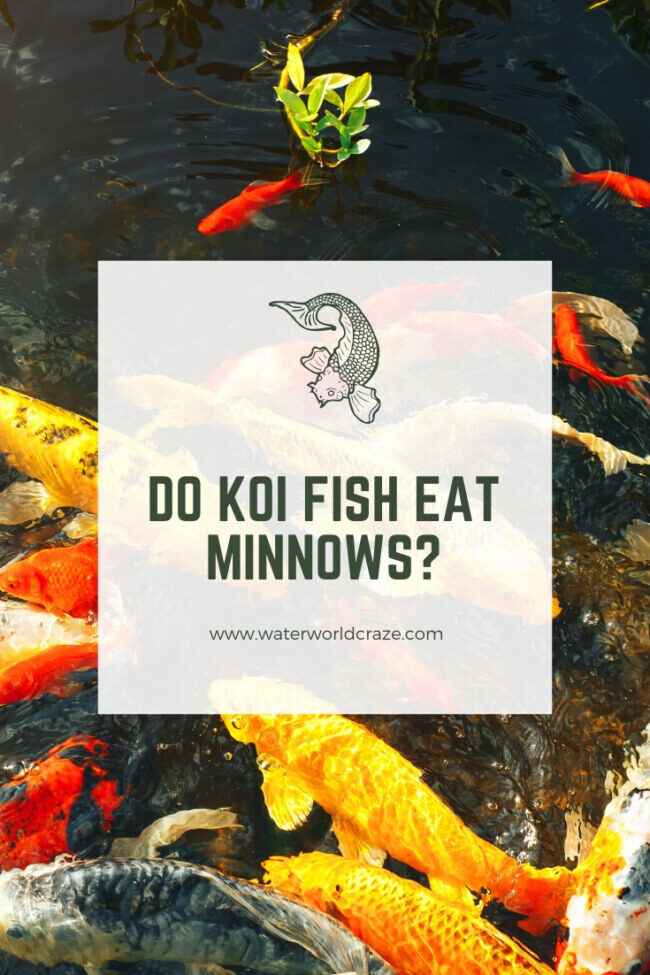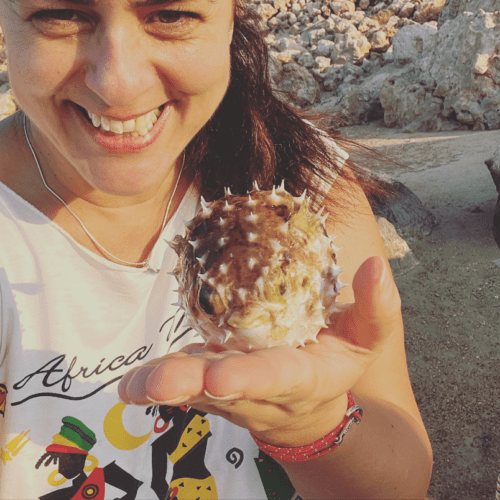 Koi fish are one of the ornamental and popular variations of the common carp that you can keep in outdoor ponds. However, outdoor ponds can become mosquito infestation quite fast.
Koi fish are one of the ornamental and popular variations of the common carp that you can keep in outdoor ponds. However, outdoor ponds can become mosquito infestation quite fast.
So, you may be considering adding up fish breeds like minnows that feed on mosquito larvae. But as minnows are small fish, it’s normal for you to wonder whether your koi fish can end up eating all of them or not.
Well, the good news is, we have the answer to that!
Do koi eat minnows? Koi fish can eat minnows. They are omnivores and can eat smaller fish that fits into their mouth when hungry. However, if your Koi has enough food source, they don’t usually go for minnows.
There are lots of other foods that your Koi can eat. You also need to avoid feeding certain foods to your Koi to keep it healthy.
Table of Contents
Koi Fish Eating Minnows
Koi fish are non-aggressive omnivores. They are also an opportunist and extremely robust fish breed that can eat up almost anything that fits in their mouth.
As they aren’t aggressive, you won’t see them hunt or eat minnows regularly. However, it doesn’t necessarily mean that if they are hungry enough, they won’t go for minnows.
If you keep them in a pond and feed them regularly, they won’t attack minnows. Koi fish would instead love to rest and save up their energy rather than chasing other fish.
However, if you are trying to feed your Koi fish minnows, then we would suggest to starve them for a while before you give them minnows to eat.
But it’s recommended that you avoid feeding your Koi fish minnows as they can carry diseases that can harm your beloved Koi.
In the worst-case scenario, it could lead to significant health problems that can lead to death!
Also, infected minnow feces can even spread the disease throughout your entire pond. So, always be careful when buying minnows.
You should try to make sure that you buy them from trusted sources to avoid any mishaps in the future.
Some of you may want to introduce minnows in your Koi pond for controlling mosquito breeding.
However, minnows can reproduce quite rapidly and can take over the entire pond if there’s no predatory fish in it. So, you have to keep their numbers at bay to keep your Koi fish healthy and happy.
Preventing Koi from Eating Minnows
Though sometimes it can be challenging to keep Koi fish with minnows in a pond, it’s not impossible. You can try out some tricks to stock both fish breeds in the pond.
Feed your Koi an adequate amount of food. You should avoid keeping them hungry for an extended amount of time and always maintain food quality.
You can add certain pond plants, water lettuce, or duckweed so that when your Koi fish gets hungry, they can eat these.
Try to create an environment for small pond insects and zooplankton to breed in the pond. When hungry, your Koi will eat them and leave the minnows alone.
You can design your pond with proper hiding places for the minnows and keep both fish breeds in a large tank or pond.
The video below shows koi living together with rosy red minnows.
Do Koi Fish Eat Other Small Fish Breeds Besides Minnows?
Well, the small answer is – YES! Other small fish breeds beside minnows can become an easy target for a hungry adult Koi fish. Smaller fish don’t have any resistance against a Koi attack.
More so, your Koi can easily pass a small fish through their mount when they suck the water to breathe or eat.
Small fish breeds like Guppies, Danios, and Siamese Algae Eater have a higher chance of getting eaten by your Koi.
Your Koi may or may not eat other medium small fish breeds like Barbs, Fancy Goldfish, Mollies, and small Catfish. However, they are known to eat fry and juvenile fish of any breed.
Large to medium fish breeds are great with Koi fish. You can stock a wide range of fish breeds with your Koi in a large tank or garden pond.
But Tench, Golden Orfe, Sturgeon, Barbel, and Pleco are the best fish to stock with Koi.
Best Food for Your Koi Fish
Koi fish can eat a wide variety of food. As they are omnivores, they need a balanced diet with vegetables and meat. So, always try to feed your Koi fish a proper balanced mean to maintain their health and color.
Pellets are one of the best commercial food for Koi fish. They are convenient, reliable, and a healthy option as the base diet for your beloved Koi.
While buying pellets for your Koi, always go for quality. You should also check the label to ensure it has proper fat, protein, minerals, and vitamins necessary for your fish.
The protein must be at least 30%, and the fat content should be at least 5%.
As for flake food, smaller Koi fish can eat those, but they have to be made specifically for Koi. Smaller Koi fish can’t eat large pellet food, so flake can be a good supplement for that.
Once your fish is big enough, switch to pellets.
Live foods are always the best option over commercial food, but they can be costly as well. Live foods are rich with protein and necessary nutrition for your Koi fish.
Koi fish tend to eat a lot of live food such as mealworms, earthworms, crickets, woodlice, mysis shrimp, brine shrimp, daphnia, small crustaceans, wax worm, silkworm, and bloodworm.
However, don’t make live food their primary source of diet. You should always use them as supplements to the base diet and like a treat.
Freeze-dried and frozen foods are also a good food source for your Koi fish. Obviously, they won’t be as good as live food, but they do contain some form of nutrition for your Koi.
Freeze-dried foods tend to have more nutritional value compared to frozen ones.
You can find earthworms, daphnia, gammarus, shrimp, tubifex worms, clams, wax moth larvae, bloodworms, black mosquito larvae, and brine shrimp in both frozen and freeze-dried form.
All of these foods have natural oils, proteins, vitamins, and minerals that will help build up your Koi’s health and protect them against diseases.
Adding vegetables to your Koi’s diet is necessary to offer the perfect balanced diet for long, healthy life. These are rich in vitamins, different fibers, antioxidants, and trace elements.
Vegetables and fruits like cucumber, garlic, duckweed, spirulina algae, broccoli, cauliflower, watermelon, orange, grapefruit, and banana are really good for Koi.
But always boil the hard vegetables for 3-5 minutes to soften them a little bit before feeding. We highly recommend feeding koi fish spinach – here are 4 reasons why!
Your Koi can also eat plain Cheerios. In fact, Koi fish tend to love Cheerios but only feed them in a small amount.
For this, you need to soak the Cheerios in water for 2-3 minutes and then toss it in the pond or tank. We explain more about feeding koi fish cheerios here!
What Should You Avoid Feeding Your Koi?
You should also avoid feeding certain foods to your Koi. Basically, stay away from low-quality commercial foods that don’t have the right balance of nutrients.
You should also avoid any food item that is high in carbohydrates like corn, bread, etc. (We explain here why you should not feed your koi fish bread)
These food are hard to digest and can cause health issues if you feed these on a regular basis.
Another thing to avoid is anything you caught yourself. You should never catch live food from lakes or streams as they can carry diseases that can harm your fish.
It might seem like a good idea at first, but you’ll have no way of knowing whether the food is harmful or not.
When Should You Feed Your Koi Fish?
If you keep your Koi fish in a garden pond, then the temperature can be a considerable factor in feeding your fish. Usually, Koi fish would eat very little when the temperature falls below 48°F (8.89°C).
If the temperature is between 48°F to 64°F (17.78°C), it’s best to offer them food like wheat germ.
When the temperature rises above, they need more protein with a mix of fruit and vegetables.
Avoid feeding your Koi fish when the temperature is below 48°F. Once the temperature becomes warmer, feed them once a day.
In the summertime, they’ll be more active and hungry. If the temperature is within 73°-77°F (22-25°C) feed then 4 times every day.
When it’s between 77°-90°F (25-32°C), feed them 5 times per day. Once the temperature reaches 90°F, do smaller frequent portions. We explain in this article what temperature koi fish need if you need help with that.
As for the quantity, you should always follow the Five Minute Rule. Feed your Koi as much as the food they can eat within five minutes. If there’s any food left, scoop it up if you can.

Marta, the driving force behind WaterWorldCraze.com, holds a Master’s degree in Marine Biology and has extensive experience in water sports and activities. With over 7+ years of hands-on experience in marine research and conservation, she has participated in numerous underwater expeditions and projects. Her passion for the aquatic world shines through in her expertly curated content. Join Marta as she explores the wonders of marine life and shares her adventures. Connect with her on Instagram @marinebiologymarta for more insights and updates.

